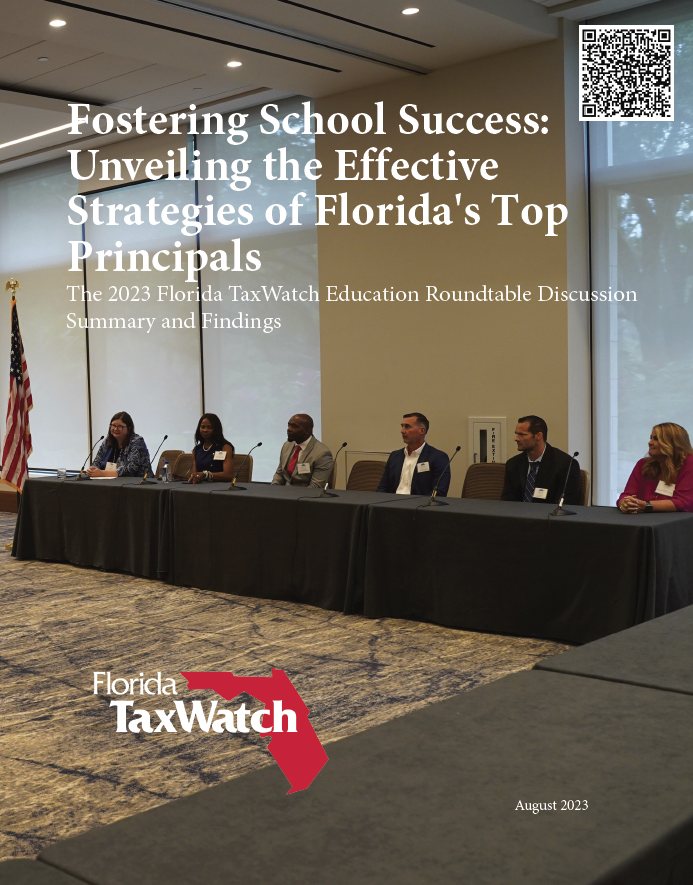Fostering School Success: Unveiling the Effective Strategies of Florida's Top Principals
The 2023 Florida TaxWatch Educations Roundtable Discussion - Summary and Findings
 Among all school-related factors that contribute to what students learn at school, leadership is perhaps second only to classroom instruction. Furthermore, the impact of leadership tends to be the greatest in schools where the learning needs of students are most acute.2 The greater the challenge, the greater the impact an effective principal can have on student learning. There are virtually no documented instances of troubled schools being turned around without intervention by an impactful leader. Many other factors contribute to such turnarounds, but leadership is the catalyst.3
Among all school-related factors that contribute to what students learn at school, leadership is perhaps second only to classroom instruction. Furthermore, the impact of leadership tends to be the greatest in schools where the learning needs of students are most acute.2 The greater the challenge, the greater the impact an effective principal can have on student learning. There are virtually no documented instances of troubled schools being turned around without intervention by an impactful leader. Many other factors contribute to such turnarounds, but leadership is the catalyst.3
In 2013, Florida TaxWatch established its prestigious Principal Leadership Awards (PLA) Program to recognize and reward Florida’s highest-performing principals whose schools draw from predominantly at-risk populations, yet whose students consistently outperform those in schools with comparable populations. Each year, Florida TaxWatch recognizes the top three elementary, top three middle, and top three high school principals, determined by a unique, data-driven methodology.
This program, the first of its kind in the U.S., uses the Florida Department of Education’s Florida Value-Added Model (FL-VAM) common school component estimates, which describe the amount of learning that is typical for students in each school that differs from the statewide conditional expectation and indicates the total contribution of the school to greater than, or less than, predicted student achievement. Using this data, Florida TaxWatch calculates student learning gains for math and reading by grade and by school year.
In May 2023, Florida TaxWatch hosted a two-hour roundtable with the latest PLA winners to discuss the philosophies, strategies, challenges, and best practices of effective principals. The PLA-winning principals are identified in the appendix. Moderated by Florida TaxWatch board member Janice Palmer, Senior Vice President, Government Affairs and Public Policy, at Helios Education Foundation, the participants discussed the following topics:
- Attracting and retaining high-quality teachers;
- Developing teachers;
- Building a productive school culture;
- Building relationships with stakeholders beyond the building; and
- Managing time and personnel.
The strategies discussed by the roundtable participants for effectively leading their schools have been summarized herein, paired with educational research that supports these strategies. This report compares the strategies employed by this year’s roundtable participants to those employed by preceding participants to identify best practices and “key takeaways” for consideration by policy makers and education professionals. A draft copy of this report was provided to the roundtable participants for feedback to ensure Florida TaxWatch accurately captured the discussion.
Please note that this report is intended to be a starting point for further discussion and examination of what these principals are doing to make their schools so successful, and what policymakers can do to begin to institutionalize these effective leadership practices, rather than represent a comprehensive review of, or a “deep dive” into, the above topics. Florida TaxWatch is pleased to present a summary of this discussion, takeaways for consideration for Florida’s education policymakers and professionals, and a summary of available research in support of those takeaways.